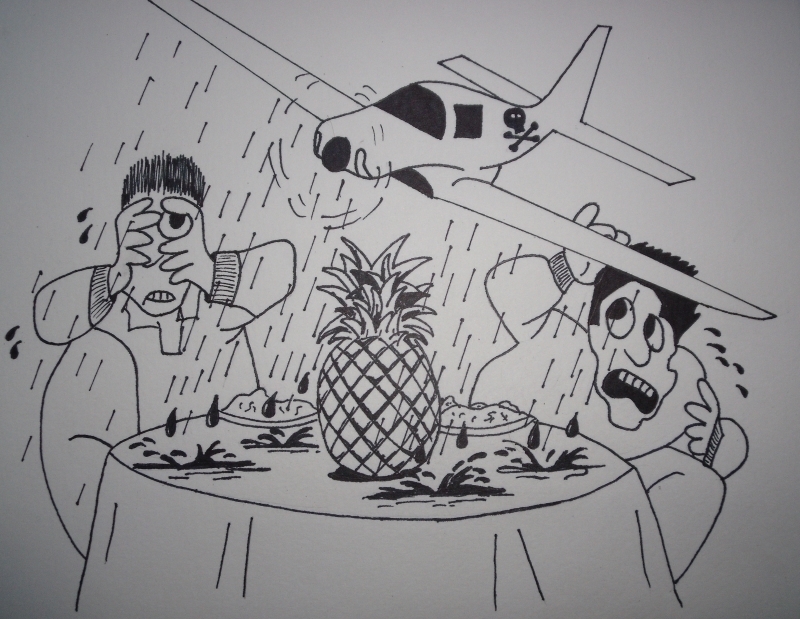In December 2021, a number of NGOs signed a letter protesting against the resumption of palm oil sourcing by multinationals such as Nestlé, Cargill, PepsiCo, Proctor and Gamble and others, from REPSA (Reforestadora de Palma S.A.) in Sayaxcha, Guatemala. This followed an inadequate response by the REPSA/HAME Group to an Open Letter sent in June 2021. The controversy, however, started in 2015 and was explained by Sheila Amoo-Gottfried for the newsletter of the Environmental Network for Central America (ENCA 84, March 2022). We are grateful to Sheila for her permission to reproduce the article in The Violence of Development website.
The letter and campaign are promoted by Forest Peoples.org, Friends of the Earth USA, Rainforest Action Network and ActionAid USA. Many other NGOs such as ENCA signed on to the letter.
By Sheila Amoo-Gottfried, March 2022
In 2015, spills from REPSA’s crude palm oil plant in Sayaxcha, Petén, led to an ecological disaster along the Pasión River, harming the livelihoods and access to water and food of Indigenous communities and causing lasting damage to the ecosystem. Fish, reptiles and mammals were massively affected along more than 100km section of the river.
Following legal action by civil society against REPSA in 2015, a court order led to the temporary closure of the plant. In the aftermath of this injunction, violence, intimidation and threats were unleashed, with the illegal detention of three human rights defenders from CONDEG (National Council of Displaced People – Guatemala) and the assassination of Rigoberto Lima, a REPSA critic. Although company personnel and security guards associated with REPSA were thought to be implicated, REPSA has denied any involvement and refuses to acknowledge and address the underlying abuses, labour exploitation, escalating violence or environmental damage.
Nothing has yet been resolved and REPSA continues to use delaying tactics and intimidation to avoid further legal action or the formation of an independent third-party verification process to assess REPSA’s progress in meeting a set of minimum requirements. These requirements include acknowledging and taking responsibility for the devastating consequences of the contamination of the Pasión River basin on the environment, public health and social fabric of the surrounding communities and establishing effective grievance mechanisms for unresolved past problems and for the future. Meanwhile, many multinationals (Cargill, Nestlé, Unilever, Ferrero, etc) have resumed resourcing palm oil from REPSA, failing to reconsider their decisions based on the evidence and recommendations provided in the Open Letter.
The UN Special Rapporteur for Human Rights said in a 2020 letter to the Guatemalan government that the contracting and labour practices of REPSA could be “indicators of human trafficking and forced labour and other severe forms of labour exploitation.” REPSA and its buyers have not responded to these allegations of human rights violations affecting their largely Indigenous workers. This is a systematic problem across the palm oil cultivating regions of Guatemala. The criminalisation of four Indigenous human rights defenders, given a suspended four-year sentence on 22nd November 2021, along with the violent displacement of the Maya Q’eqchi community ‘Palestina’ in Chinebal, El Estor on November 16th [2021] are further indications that human rights violations in this sector are ongoing and endemic.
In December 2021, numerous national civil society organisations (CSOs) and international non-governmental organisations (NGOs) maintained their call on these multinationals to continue the suspension of sourcing palm oil from REPSA until judicial process has reached a satisfactory conclusion regarding the case of ecocide. REPSA also has to accept the undertaking of a thorough, objective and transparent independent investigation into the complaints represented in ongoing reports of human rights violations and environmental damage caused by its operations and supply chain.
Furthermore, taking into account the issues raised in the UN Human Rights Rapporteur’s letter, REPSA is required to enter into serious and responsible dialogue with impacted communities and Guatemalan CSOs for verifiable and practical solutions, and to repair and redress the environmental and economic damage done in the affected communities.
https://enca.org.uk/blog/2022/03/11/newsletter-84/
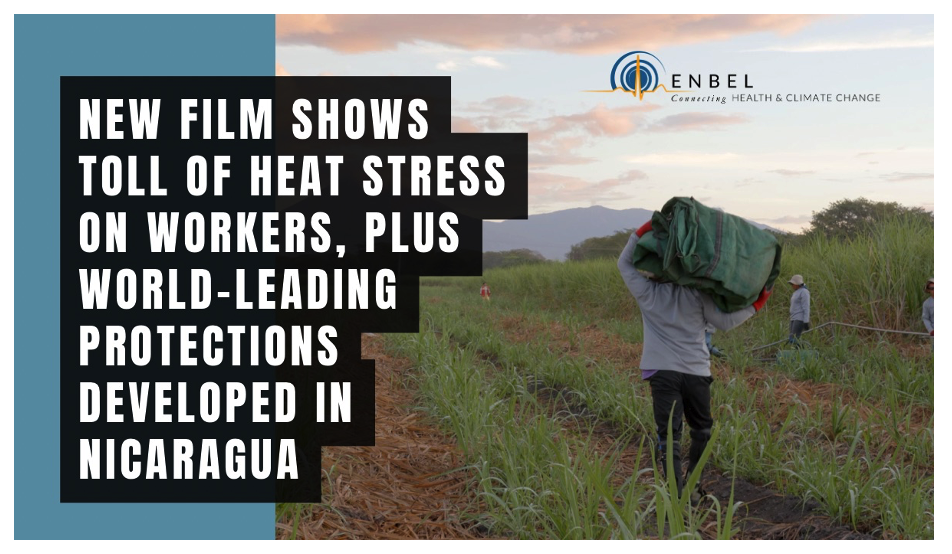
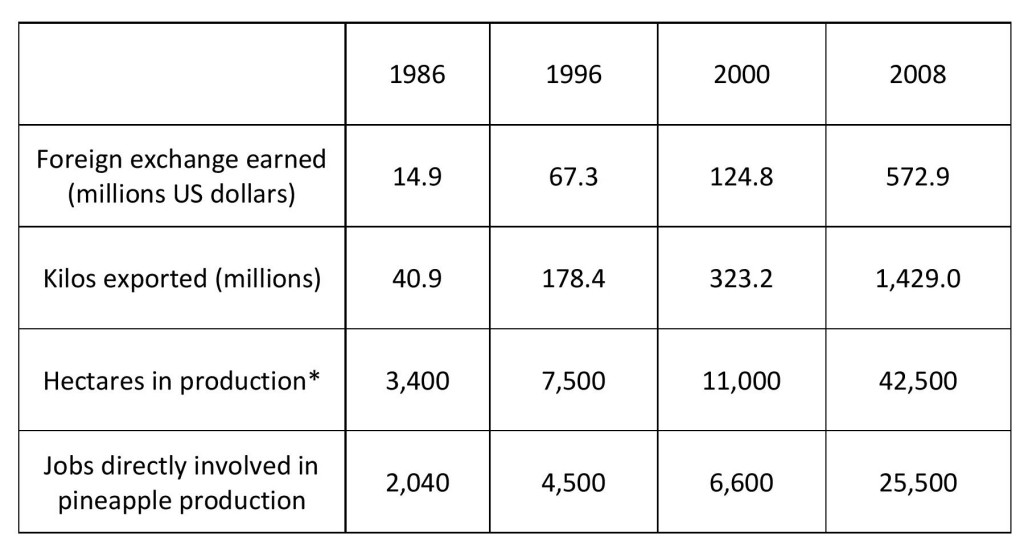
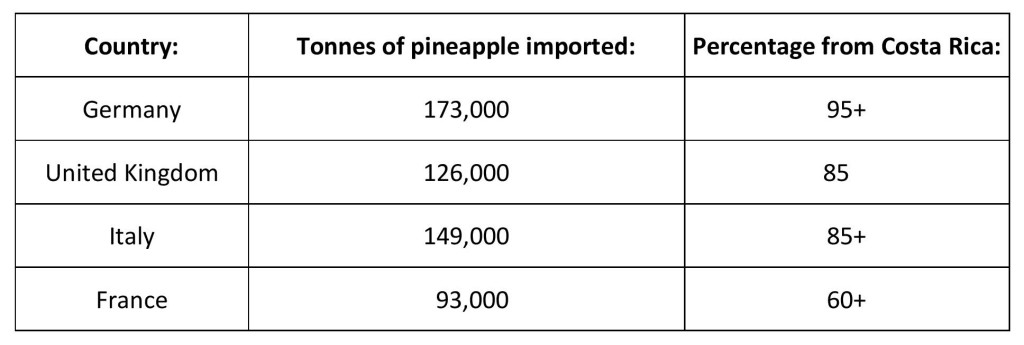
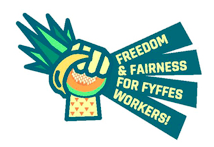 The following article focuses on banana production with an examination of the practices of the major importing company Fyffes. I am grateful to Banana Link for permission to reproduce extracts from their article which appeared in the Make Fruit Fair! Newsletter of 23rd January 2017.
The following article focuses on banana production with an examination of the practices of the major importing company Fyffes. I am grateful to Banana Link for permission to reproduce extracts from their article which appeared in the Make Fruit Fair! Newsletter of 23rd January 2017.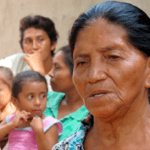 “They never contributed to social insurance and now I will not be able to retire or finally rest after so many years spent on the plantations. I have to continue looking for work to survive.” – María Gómez (65) who worked for nearly 30 years as a supervisor at Melon Export SA.
“They never contributed to social insurance and now I will not be able to retire or finally rest after so many years spent on the plantations. I have to continue looking for work to survive.” – María Gómez (65) who worked for nearly 30 years as a supervisor at Melon Export SA. “I got pregnant, and they do not allow pregnancy” – Marys Suyapa Gómez, sacked for being pregnant after working at Suragroh for 15 years
“I got pregnant, and they do not allow pregnancy” – Marys Suyapa Gómez, sacked for being pregnant after working at Suragroh for 15 years “Fyffes must take responsibility for ensuring that their local managements in Costa Rica and Honduras recognise and enter into good faith negotiations with local unions and that company-wide freedom of association and collective bargaining is respected at every level.“ – Ron Oswald, General Secretary, International Union of Foodworkers.
“Fyffes must take responsibility for ensuring that their local managements in Costa Rica and Honduras recognise and enter into good faith negotiations with local unions and that company-wide freedom of association and collective bargaining is respected at every level.“ – Ron Oswald, General Secretary, International Union of Foodworkers.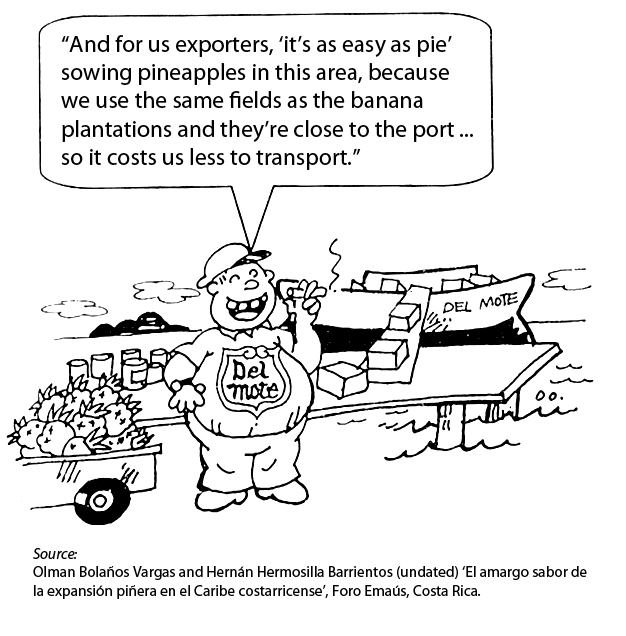
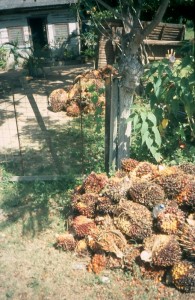 African Oil Palm was first introduced to Honduras in 1927 and by the 1970s there were 11,000 hectares planted throughout the northern part of the country.[1] Traditionally, Honduran palm oil has been produced for use in the food industry to make products such as margarine and cooking oil. In 2006, however, the Honduran government launched a five year program to promote the use of agrifuels with the aim of expanding the total cultivation area of 84,000 hectares by 200,000 hectares.[2]
African Oil Palm was first introduced to Honduras in 1927 and by the 1970s there were 11,000 hectares planted throughout the northern part of the country.[1] Traditionally, Honduran palm oil has been produced for use in the food industry to make products such as margarine and cooking oil. In 2006, however, the Honduran government launched a five year program to promote the use of agrifuels with the aim of expanding the total cultivation area of 84,000 hectares by 200,000 hectares.[2]